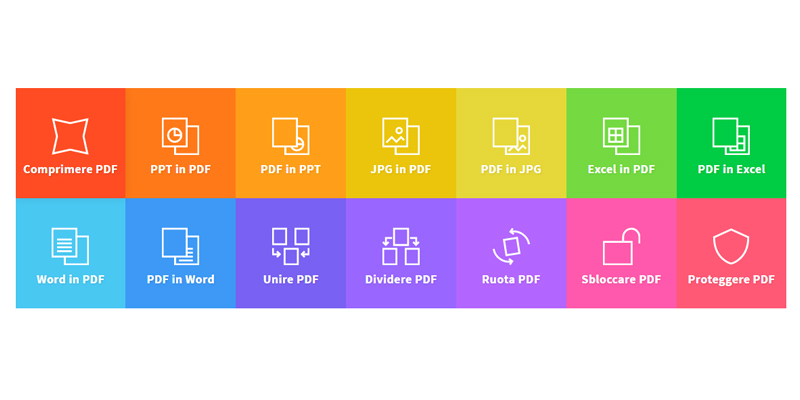The benefits of having a business website
During business discussions with entrepreneurs or freelancers who do not yet own a website, some of them are reluctant to create one.
Although I am often not even proposing to them to develop one, I am sometimes anticipated with the following objections: “we would do it, but it costs too much” or “we had it but we took it away because it cost too much” “We already have Facebook, a what do we need a site for ?! ” “We have always done without” “We all already know” “We already have enough work”.
In fact, in my opinion, most of these arguments do not correspond to the real thinking of those who formulated them: I perceive, in fact, that what is basically holding back these people is the fear of increasing the costs of their business without having results.
If you also think the same way, I advise you to continue reading; below you will find 10 reasons why, in my opinion, you can’t do without a website.
1) The website is your online business card
The web is a world that, willy-nilly, no entrepreneur or freelancer, in 2018, can afford to ignore for its strength and communicative effectiveness.
Your website is your online space; if well conceived and updated, it will give the right information to your customers.
Once created, you can enter the address on your email address, on your business card, on your social media accounts, on flyers and brochures. You will see that many people will consult it to get more information about your services/products.
2) You can place your showcase wherever you want
In terms of SEO positioning, you can consider a website as a real shop; with the only difference that a physical store, once you have purchased it, is not so easy to move.
Even if the place is rented, to move your business you will have to make a move with consequent loss of time and costs to be incurred.
With a website, however, this operation is much simpler; you just need to know where to place it.
Are you wondering how? Now I’ll explain it to you.
Just compare a keyword that is important to you to a high street.
I’ll give you an example; if you are the owner of a hardware store in Vigevano, it will be important for you that, when a user searches on Google for “Hardware Vigevano”, your business appears.
Here is the link: all the results you find on the front page are the activities located in the main street of your city, the one with greater passage and visibility.
In second page there are the activities that you find in a side street to the main one where the passage is lower.
If your site is on third page or beyond, it is as if you were in suburbs or in a small neighboring village, where, if you are lucky, 3 people see you a day.
By working on this aspect, you can take your shop from the small village to the busiest street in Vigevano.
3) Does the website cost too much? Lie!!!
If you think your website costs too much I think you don’t have a good web consultant.
First of all, the site costs in relation to the results you want to have and if properly exploited “it pays for itself” bringing customers to your business and increasing the sale of your products/services.
Also, when compared to all the other forms of advertising, it is one of the cheapest.
As much as a website may cost, it is nothing when compared to the cost of posting a billboard or a space in a newspaper. Not to mention a TV commercial.
4) The website is the center of your marketing strategies
The site, as an online showcase of your business, can be used to “land” advertising campaigns.
For example, if you have an ongoing promotion and you want to spread it within a geographical area, you can create a landing page on your site (a specially created thematic page) where advertising campaigns can be merged.
5) You can handle it yourself
This obviously depends on whether the web agency that creates it grants you the ability to independently manage the contents and whether the site is developed using an intuitive and easy-to-learn CMS.
If so, the freedom to intervene on your site by updating and implementing the content text and images if necessary, is undoubtedly a huge advantage.
Do you want to know how to increase visits to your website?
Book a free appointment online now.
6) The website "works even when you sleep"
Once you have created and carried out the necessary activities to place it on search engines, your site works alone and continues to bring you visits and contacts, without the need to invest time and energy every day.
7) The website informs your customers
I often suggest to my clients, when creating content, to think about the questions they are usually asked and to give answers to these questions.
Usually, in fact, the first need that a user intends to satisfy by visiting a website is information.
When I browse the website of a company, I do it to find out something about this company and the activity it carries out, expanding the package of information already in my possession.
“How long has this business been open? What experience have you gained in a given sector? What services does it perform and what characteristics do they have? What products does it sell? What are the opening hours and days?”
This is only a small part of the questions that site users try to answer.
Creating content able to satisfy these needs allows us to achieve two results:
– The most obvious is that you you will receive several phone calls that force you to repeat always the same things merging the same type of information; information that you could enter on your website;
– You will make more pleasant and profitable the experience of the user on your website (parameter that is also taken into consideration by Google for positioning).
If you want more tips on this, read our blog article What content to include on the website.
8) The site can perform various functions in addition to information
In addition to being, as mentioned above, the online showcase of your business, it can for example collect requests for quotes from users who visit your site and who, by filling out a contact form, they will ask you to make an economic offer for the performance of a specific service or for the sale of one of your products.
The requests that will be forwarded through the form will be sent to your e-mail account.
Obviously, in addition to this which is a “basic” solution, it is possible to develop more complex systems that allow the user to select the desired services with the features available, creating the quote themselves through a guided procedure.
Another function that a website can perform for you is to register a reservation.
This is a widely used solution in the field of accommodation facilities.
Think of a hotel that, through its website, informs users who want to stay there of the availability of a given room, verified which, can be booked on certain dates.
Another interesting development can be that of a reserved area, where you can upload files that are accessible only to those who have the credentials to access them, limiting the dissemination of the contents therein to a single person or to a selected group (see also our article “Why create a reserved area for your website“)
The above are just three examples of the numerous configurations that can be made to a site to perform the tasks that interest us.
9) The website builds customer loyalty
In addition to making itself known to new customers, the website can be a valid tool to retain those already acquired.
Creating a blog or a news section in which to insert all the news relating to the services and products you provide will entice people to follow you periodically and increase visits to your site.
Through the site you can also request visitors to subscribe to a newsletter service through which you send offers and promotions to customers, encouraging them to purchase additional products.
10) The website collects important information about your visitors
By installing a analysis tool on it (the best known is probably Google Analytics) you can collect information about your audience and create a profile.
For example, you can monitor the behavior that users have in relation to the contents of your website, checking which pages are the most visited (and therefore which services and products are the most popular), which are fewer (in order to make improvements and increase visits), what is the average age of the users, in which days and times most of the views (this is important, for example, if you want to run an advertising campaign) and much more.
Ultimately, a website is not a cost but an added value for your company.
As such of course, if made by a professional, it is not free. Nevertheless, it is of fundamental importance.
On the other hand, everything or almost everything, even in the workplace, has a cost. But can this be done without?
Even using a smartphone has a cost both in the purchase and use phase. So would you go back to the payphone?!






